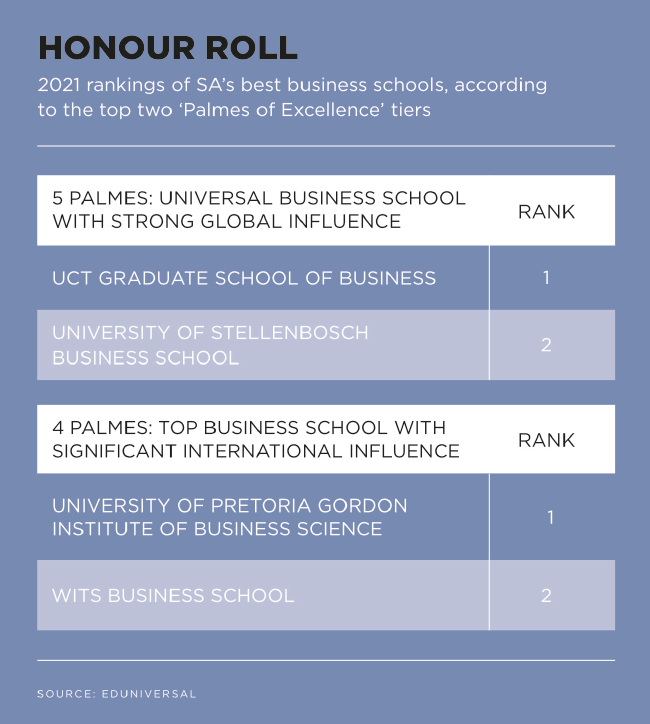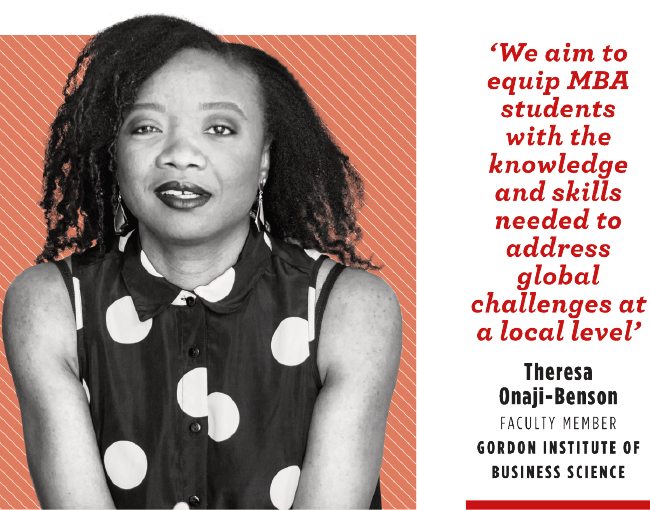The purpose of a traditional MBA used to lie in boosting a career and earning power, rather than learning how to save the world. But this has changed. Today’s MBA places an increasing value on having purpose by making a sustainable impact on business and society, or what the Financial Times calls combining mainstream with green-stream.
‘Empowering students to take their careers to new levels is anchored in developing ethical leaders for the common good. In other words, emphasising not only the development of great business leaders, but leadership for the common good,’ says Cobus Oosthuizen, dean of Milpark Business School.
MBA students have come to view business as an agent of change rather than just a way to make profits, and therefore need to tackle one of the most pressing challenges facing business at all organisational levels, namely under-standing the risks and opportunities raised by climate change and biodiversity degradation, according to Kutlwano Ramaboa, deputy director of UCT’s Graduate School of Business (GSB). ‘Hence we aim to develop leaders who can create solutions for a just transition to a carbon-neutral future that will contribute to the development of the country and continent, and especially our most vulnerable citizens.’
The trend towards sustainability in MBA programmes has been evolving for years in line with the global shift from shareholder to stakeholder capitalism, as a response to corporate failures, environmental disasters, social inequalities, the climate crisis and, most recently, the chaos caused by COVID-19.
The ‘green-streaming’ of the MBA is important for several reasons. For one, careers in traditional business sectors increasingly require knowledge in environmental, social and governance (ESG) topics to tackle issues such as climate change and diversity and inclusion in the supply chain. This is already obvious in the financial sector where ESG investing is flourishing, as fossil-fuel finance is being phased out. In addition, millennials and Gen Z want to work for responsible companies. And worldwide, it’s young people, such as climate activist Greta Thunberg, who are contributing to change.
‘Student activism, whether against state capture or planet extinction, is part and parcel of Henley Africa’s DNA,’ says Jon Foster-Pedley, dean of Henley Business School in Africa. ‘We established HenleyEARTH – Environmental Activism through Research and Training – in 2018 to direct research projects to provide deep, impactful insights that can create roadmaps for governments, corporates and institutions.’
Business schools play a critical role in shaping leaders who can create organisational structures and processes that have a bias towards responsible leadership, explains Jako Volschenk, MBA programme head at the University of Stellenbosch Business School (USB). ‘That means what students know, do and believe after their MBA plays a critical role in how the businesses that they lead behave.’
And here a focus on the local SA context is important, according to Theresa Onaji-Benson, a full-time faculty member at Pretoria University’s Gordon Institute of Business Science (GIBS). ‘We aim to equip MBA students with the knowledge and skills needed to address global challenges at a local level through business strategies that integrate sustainability,’ she says.
SA’s business schools are regulated by the Council on Higher Education to keep their MBA programmes generalist – unlike their global counterparts that are enthusiastically launching specialist MBAs with sustainability themes. So while locally accredited MBAs are allowed to have industry-specific electives within the generalist qualifications, they won’t anytime soon offer degree courses such as the MBA in the purpose economy that is being taught in Groningen (the Netherlands), MBA renewables in Berlin (Germany), master’s in management and responsible business administration (Spain), sustainable innovation MBA or MBA in sustainable development and diplomacy’ (both in the US).
‘Institutions of learning – from basic right up to business schools – must realise and deliver on the “knowing, doing and being” principles, and it matters now more than ever,’ says Shireen Chengadu, group chief academic officer of Growth Ten, the holding company of Richfield Graduate Institute of Technology and the AAA School of Advertising. ‘It is incumbent on us to ensure that our graduates emerge with far more than knowledge; it is the spirit and culture of doing and being – entrenching a strong value system – that is sorely lacking.’
She adds that, as leadership is holistic, MBA curricula shouldn’t teach the creation of shareholder value at the risk of all else. ‘Ethics, integrity and inculcation of a strong value system are as equally important as the content we teach in MBA curricula,’ she says.
In Africa, UCT’s GSB was one of the first business schools worldwide to incorporate social innovation as part of the MBA curriculum. The school now offers the largest academic body of work on impact investing on the continent, according to Ramaboa. ‘Interest by MBA applicants in recent years has been specifically because of our focus on social innovation, enterprise development, socially responsible investment and impact investing – courses offered on our programme, as well as work done through the Bertha Centre for Social Innovation and Entrepreneurship at the school,’ she says.
The country’s business schools are using different approaches to keep their MBA programmes relevant for the emerging-market context and for the uncertainties of the post-COVID era. ‘There is no playbook for what we have just experienced, but the MBA provides its graduates with the tools to think critically, rationally and systematically, to identify threats and develop strategies to overcome and flourish,’ says Foster-Pedley. ‘The MBA has never been more relevant than it is now.’
At USB, Volschenk explains, the teaching faculty is encouraged to keep content and case studies fresh and relevant. ‘COVID gave us wonderful examples of how companies pivoted their strategy, or how leadership had to adjust,’ he says. ‘Furthermore, MBA programmes often have electives though which they can augment the “core” modules with newer topics such as cryptocurrency.
‘It [also] remains important to design for flexibility. For instance, we are increasingly looking at how micro-credentials can be recognised as building blocks of an MBA programme to provide much more flexibility in what a business degree needs to look like.’
Technology is continuously reshaping the delivery and format of the courses, to the extent that USB and Wits no longer offer a full-time MBA. The trend is moving towards modular, block and executive MBAs. And while Milpark is offering Africa’s first fully online MBA, most other providers believe a hybrid, blended model that includes some in-person classroom interaction is the way forward.
Henley Africa has ventured into virtual reality (VR) and wants to extend its current pilot into a collaborative, immersive learning experience for MBA students. Participants wearing Oculus Quest 2 headsets will ‘meet’ in a virtual room to work together on a whiteboard as avatars, as seamlessly as being in the same room on campus.
This type of VR and online learning reduces greenhouse gas emissions by eliminating the need for actual travel. Minimising the carbon footprint of business schools is vital for their credibility in sustainability education and research. The Association of MBAs and the Business Graduates Association conducted a 2020/21 survey, called the International Climate Change Report, which found that business school leaders regard business sustainability as the most important issue facing business in the next five years and recognise the strong link between climate change and business. Meanwhile the UK-based Times Higher Education Impact Rankings are currently the only global performance tables that assess universities against the 17 UN Sustainable Development Goals (SDGs).
‘One of the ways business schools can become actively engaged in the SDGs is by participating in the UN Principles for Responsible Management Education [PRME],’ says Onaji-Benson. She explains that GIBS was invited to participate in the small global PRME Champions group, which focuses on developing and sharing best practices in thought and action leadership on the SDGs.
‘In recent years, the curriculum of the GIBS MBA programme has evolved to include a specific focus on sustainability and the SDGs,’ she says. ‘The SDG-relevant – but not SDG-specific – subjects taught in the core MBA curriculum include the socio-political context of business, systems thinking, complexity – in which climate change is the focus of a case study discussion, as well as innovation, digital business strategy and responsible leadership. It is through these courses that GIBS aims to equip MBA students with the knowledge and skills needed to address global challenges at a local level through business strategies that integrate sustainability.’
Her colleague at USB, Volschenk, argues that SA business schools are seriously under-recognised in their work in the ESG space because they don’t have sufficient resources for marketing campaigns.
‘We have to choose between doing what is right or advertising it, and I am glad to say that most South African schools do more than what you would see in the media. In that regard I think there must be much more “co-opetition” – co-operation between competing organisations – between South African schools to showcase what we do,’ he says.
Volschenk adds that ‘sustainability should not be bolted content onto a traditional MBA. The fundamental assumption of every module is different when your departure point is to make the world a better place’.
As global crises such as the pandemic and climate change keep reminding us, sustainability needs to be the basis of all our thinking, with the MBA leading the way, combining mainstream with green-stream.










